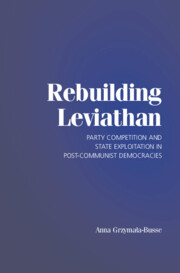Book contents
- Frontmatter
- Contents
- Acknowledgments
- List of Political Party Abbreviations and Acronyms
- 1 INTRODUCTION
- 2 COMPETING FOR THE STATE
- 3 DEVELOPING THE FORMAL INSTITUTIONS OF THE STATE
- 4 THE EXPANSION OF STATE ADMINISTRATION: PATRONAGE OR EXPLOITATION?
- 5 PRIVATIZING THE STATE: PARTY FUNDING STRATEGIES
- CONCLUSION
- APPENDIX A PEAK PARTY ORGANIZATIONS IN POST-COMMUNIST DEMOCRACIES, 1990–2004
- APPENDIX B DETERMINING STATE ADMINISTRATION EMPLOYMENT AND RATE OF GROWTH
- APPENDIX C ANCHORING VIGNETTES
- Bibliography
- Index
- Cambridge Studies in Comparative Politics
CONCLUSION
Published online by Cambridge University Press: 05 June 2012
- Frontmatter
- Contents
- Acknowledgments
- List of Political Party Abbreviations and Acronyms
- 1 INTRODUCTION
- 2 COMPETING FOR THE STATE
- 3 DEVELOPING THE FORMAL INSTITUTIONS OF THE STATE
- 4 THE EXPANSION OF STATE ADMINISTRATION: PATRONAGE OR EXPLOITATION?
- 5 PRIVATIZING THE STATE: PARTY FUNDING STRATEGIES
- CONCLUSION
- APPENDIX A PEAK PARTY ORGANIZATIONS IN POST-COMMUNIST DEMOCRACIES, 1990–2004
- APPENDIX B DETERMINING STATE ADMINISTRATION EMPLOYMENT AND RATE OF GROWTH
- APPENDIX C ANCHORING VIGNETTES
- Bibliography
- Index
- Cambridge Studies in Comparative Politics
Summary
There is as much difference between us and ourselves as there is between us and others.
Michel de Montaigne, EssaisPost-communist state exploitation leads us to reconsider political parties as competitors and as state builders – and to rethink states as the set of institutions that can emerge willy-nilly from political party competition. Thrust into the constantly shifting landscape of an authoritarian regime collapse and rising democratic and market competition, post-communist political parties faced unprecedented challenges. They began to rebuild state structures while learning to compete for electoral support and access to governance. These anxious and fragile parties opportunistically reconstructed the state both to ensure their own immediate survival and that of a democratic system that would prize political parties and could withstand a backslide into authoritarianism.
The swift pace and intensity of post-communist transformations placed political parties in a central policy role, giving them a means to exploit the state. The motives were straightforward: party survival and a commitment to democracy. The opportunities lay in the vulnerabilities of the extant communist state structures and the absence of existing institutional constraints. The same parties both designed reforms and directly stood to benefit from them. Rapid state reconstruction also meant little consultation with society or nongovernmental actors; the actions of governing parties directly influenced both who had access to power and how it was exercised.
Yet the very democracy that gave rise to these political parties could also constrain their exploitation of the state through robust competition.
- Type
- Chapter
- Information
- Rebuilding LeviathanParty Competition and State Exploitation in Post-Communist Democracies, pp. 222 - 228Publisher: Cambridge University PressPrint publication year: 2007

